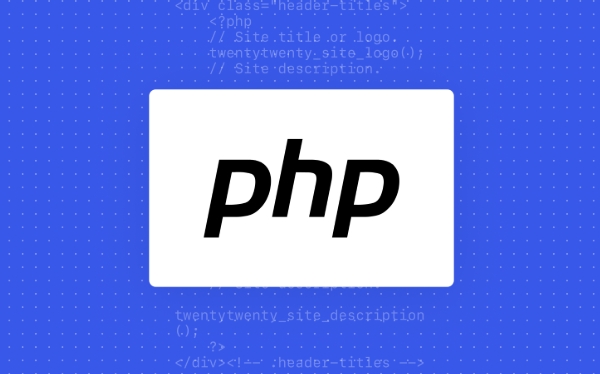 Backend Development
Backend Development
 PHP Tutorial
PHP Tutorial
 Memory Management and PHP Data Types: A Performance Perspective
Memory Management and PHP Data Types: A Performance Perspective
Memory Management and PHP Data Types: A Performance Perspective
Jul 28, 2025 am 04:42 AMPHP's memory management is based on reference counting and cycle recycling. Different data types have a significant impact on performance and memory consumption: 1. Integers and floating-point numbers have small memory usage and the fastest operation, and should be used for numerical operations first; 2. Strings adopt a write-on-write copy mechanism, but large strings or frequent splicing will cause performance problems, so it is advisable to use implode optimization; 3. Array memory overhead is high, especially large or nested arrays. Generators should be used to process large data sets and release variables in a timely manner; 4. Objects are passed in reference mode, and instantiation and attribute access are slow, which is suitable for scenarios where behavioral encapsulation is required; 5. Resource types need to be manually released, otherwise it may lead to system-level leakage. In order to improve performance, data types should be selected reasonably, memory is released in a timely manner, big data should be avoided by global variables, and memory_get_usage and opcache should be monitored and optimized, so as to effectively control memory usage and improve execution efficiency.

When working with PHP—especially in performance-critical applications like large-scale web systems or long-running scripts—understanding how memory management interacts with PHP data types is cruel. While PHP abstracts much of the low-level complexity, essential use of data types can lead to bloated memory usage, slower execution, and scalability issues.

Let's break down how PHP manages memory and how different data types impact performance.
How PHP Managements Memory
PHP uses a reference-counting garbage collector (with a cycle collector added in PHP 5.3 ) to manage memory. Each variable in PHP is stored as a zval (Zend value) structure, which contains:

- The variable's value
- Its type
- A reference count
- Other metadata (like if it's a reference or not)
When a variable is created, PHP allocates memory for the zval . When the variable goes out of scope or is unset, the reference count drops. If it reaches zero, the memory is freed immediately. However, circular references (eg, objects referencing each other) can prevent cleanup, which is why PHP also runs a cycle detection process periodically.
Memory usage isn't just about how many variables you create—it's also about how they're copied, shared, and modified.

PHP Data Types and Their Memory Impact
Different data types have different memory footprints and behaviors under the hood. Here's a breakdown of common types from a performance and memory standpoint.
1. Integers and Floats (Scalars)
- Memory : ~8 bytes for integers on 64-bit systems (can vary), ~8 bytes for floats (double precision).
- Behavior : Passed by value. No reference counting overhead.
- Performance : Fastest to work with. Minimal memory footprint.
? Tip : Use integers instead of strings for IDs, counters, or loop indices. Avoid unnecessary type juggling (eg, using a string '123' in math operations).
2. Strings
- Memory : Variable size. PHP stores the string length and encoding info. Internally, each character in a regular string is 1 byte (ASCII), but UTF-8 multibyte chars take more.
- Copy Behavior : Copy-on-write. Multiple variables can share the same string until one is modified.
- Performance Risk : Large strings (eg, file contents, JSON blobs) can consume significant memory. Concatenating strings in loops (eg,
$str .= "x";) can be slow due to repeated reallocation.
? Better approach :
$parts = [];
for ($i = 0; $i < 1000; $i ) {
$parts[] = "item$i";
}
$result = implode('', $parts); // Much faster3. Arrays (Especially Large or Nested Ones)
- Memory : High. An empty array takes ~72 bytes. Each key-value pair adds overhead (~70 bytes per entry).
- Internals : PHP arrays are ordered hash maps (not C-style arrays), so they're flexible but memory-heavy.
- Copy-on-write : Arrays are copied only when modified after assignment.
? Memory trap :
$data = range(1, 100000); // 100k integers – uses ~8MB $copy = $data; // No immediate memory duplication (COW) $copy[] = 'extra'; // Now a full copy is made – spikes memory
? Optimization tips :
- Use generators instead of large arrays when processing data streams.
- Unset large arrays when done:
unset($data); - Prefer
foreachoverforwithcount()in loops (avoid repeated function calls).
4. Objects
- Memory : Higher than arrays. Each object has overhead (class info, property table, etc.).
- Passing : Always by handle (like a reference), so copying an object variable doesn't duplicate data.
- Performance : Object instantiation is slower than array creation. Property access is slightly slower than array access.
? Use objects when you need encapsulation and behavior, not just data storage.
5. Resources
- Memory : Small
zval, but points to external system resources (DB connections, file handles). - Management : Not cleaned by reference counting alone—must be explicitly closed (eg,
fclose()). - Risk : Leaking resources (eg, open database connections) can exhaust system limits even if PHP memory looks fine.
Practical Tips for Memory-Efficient PHP
To optimize performance from a memory perspective:
- ? Use appropriate types : Don't store numbers as strings. Avoid JSON-encoded arrays when native arrays suffice.
- ? Process data in chunks : Use generators (
yield) for large datasets. - ? Unset large variables early : Free memory when you're done with big arrays or strings.
- ? Avoid global or static variables holding large data : They persist across requests in SAPIs like PHP-FPM.
- ? Profile memory usage :
echo memory_get_usage() . " bytes\n"; echo memory_get_peak_usage() . " bytes\n";
- ? Enable opcache : Reduces memory and improves execution speed by caching compiled scripts.
Summary
PHP's memory management works well for typical web requests, but inefficiencies in data type usage can quickly add up—especially in long-running scripts or high-traffic apps. Scalars are cheap, strings and arrays are flexible but costly at scale, and objects add structure at a performance cost.
By choosing the right data types, avoiding unnecessary copies, and being mindful of scope and lifecycle, you can significantly reduce memory bloat and improve performance.
It's not about avoiding powerful features—it's about using them wisely.
The above is the detailed content of Memory Management and PHP Data Types: A Performance Perspective. For more information, please follow other related articles on the PHP Chinese website!

Hot AI Tools

Undress AI Tool
Undress images for free

Undresser.AI Undress
AI-powered app for creating realistic nude photos

AI Clothes Remover
Online AI tool for removing clothes from photos.

Clothoff.io
AI clothes remover

Video Face Swap
Swap faces in any video effortlessly with our completely free AI face swap tool!

Hot Article

Hot Tools

Notepad++7.3.1
Easy-to-use and free code editor

SublimeText3 Chinese version
Chinese version, very easy to use

Zend Studio 13.0.1
Powerful PHP integrated development environment

Dreamweaver CS6
Visual web development tools

SublimeText3 Mac version
God-level code editing software (SublimeText3)
 Modernizing Your Codebase with PHP 8's Union Types
Jul 27, 2025 am 04:33 AM
Modernizing Your Codebase with PHP 8's Union Types
Jul 27, 2025 am 04:33 AM
UpgradePHP7.xcodebasestoPHP8 byreplacingPHPDoc-suggestedtypeslike@paramstring|intwithnativeuniontypessuchasstring|intforparametersandreturntypes,whichimprovestypesafetyandclarity;2.Applyuniontypestomixedinputparameters(e.g.,int|stringforIDs),nullable
 The Duality of PHP: Navigating Loose Typing vs. Strict Type Declarations
Jul 26, 2025 am 09:42 AM
The Duality of PHP: Navigating Loose Typing vs. Strict Type Declarations
Jul 26, 2025 am 09:42 AM
PHP supports the coexistence of loose types and strict types, which is the core feature of its evolution from scripting languages to modern programming languages. 1. Loose types are suitable for rapid prototyping, handling dynamic user input, or docking with external APIs, but there are problems such as risk of implicit type conversion, difficulty in debugging and weak tool support. 2. Strict type is enabled by declare(strict_types=1), which can detect errors in advance, improve code readability and IDE support, and is suitable for scenarios with high requirements for core business logic, team collaboration and data integrity. 3. Mixed use should be used in actual development: Strict types are enabled by default, loose types are used only when necessary at the input boundaries, and verification and type conversion are performed as soon as possible. 4. Recommended practices include using PHPSta
 PHP 8.1 Enums: A New Paradigm for Type-Safe Constants
Jul 28, 2025 am 04:43 AM
PHP 8.1 Enums: A New Paradigm for Type-Safe Constants
Jul 28, 2025 am 04:43 AM
Enums introduced in PHP8.1 provides a type-safe constant collection, solving the magic value problem; 1. Use enum to define fixed constants, such as Status::Draft, to ensure that only predefined values are available; 2. Bind enums to strings or integers through BackedEnums, and support conversion from() and tryFrom() between scalars and enums; 3. Enums can define methods and behaviors, such as color() and isEditable(), to enhance business logic encapsulation; 4. Applicable to static scenarios such as state and configuration, not for dynamic data; 5. It can implement the UnitEnum or BackedEnum interface for type constraints, improve code robustness and IDE support, and is
 Understanding the `callable` Pseudo-Type and Its Implementation
Jul 27, 2025 am 04:29 AM
Understanding the `callable` Pseudo-Type and Its Implementation
Jul 27, 2025 am 04:29 AM
AcallableinPHPisapseudo-typerepresentinganyvaluethatcanbeinvokedusingthe()operator,usedprimarilyforflexiblecodeincallbacksandhigher-orderfunctions;themainformsofcallablesare:1)namedfunctionslike'strlen',2)anonymousfunctions(closures),3)objectmethodsv
 The Perils of Precision: Handling Floating-Point Numbers in PHP
Jul 26, 2025 am 09:41 AM
The Perils of Precision: Handling Floating-Point Numbers in PHP
Jul 26, 2025 am 09:41 AM
0.1 0.2!==0.3inPHPduetobinaryfloating-pointprecisionlimitations,sodevelopersmustavoiddirectcomparisonsanduseepsilon-basedchecks,employBCMathorGMPforexactarithmetic,storecurrencyinintegerswhenpossible,formatoutputcarefully,andneverrelyonfloatprecision
 Unraveling PHP's Type Juggling: A Guide to `==` vs. `===`
Jul 28, 2025 am 04:40 AM
Unraveling PHP's Type Juggling: A Guide to `==` vs. `===`
Jul 28, 2025 am 04:40 AM
==performsloosecomparisonwithtypejuggling,===checksbothvalueandtypestrictly;1."php"==0istruebecausenon-numericstringsconvertto0,2.emptystrings,null,false,and0arelooselyequal,3.scientificnotationlike"0e123"=="0e456"cancau
 The Life of a Variable: PHP's Internal `zval` Structure Explained
Jul 27, 2025 am 03:47 AM
The Life of a Variable: PHP's Internal `zval` Structure Explained
Jul 27, 2025 am 03:47 AM
PHP uses zval structure to manage variables. The answer is: 1. zval contains values, types and metadata, with a size of 16 bytes; 2. When the type changes, only the union and type information need to be updated; 3. Complex types refer to structures with reference counts through pointers; 4. When assigning values, copy is used to optimize memory; 5. References make variables share the same zval; 6. Recycling references are processed by a special garbage collector. This explains the underlying mechanism of PHP variable behavior.
 Resource Management in PHP: The Lifecycle of a `resource` Type
Jul 27, 2025 am 04:30 AM
Resource Management in PHP: The Lifecycle of a `resource` Type
Jul 27, 2025 am 04:30 AM
The life cycle of PHP resources is divided into three stages: 1. Resource creation, obtaining external system handles through functions such as fopen and curl_init; 2. Resource usage, passing resources to related functions for operation, PHP maps to the underlying system structure through resource ID; 3. Resource destruction, manually calling fclose, curl_close and other functions should be given priority to release resources to avoid relying on automatic garbage collection to prevent file descriptors from exhausting. Best practices include: always explicitly close resources, use try... finally ensure cleanup, prioritize objects such as PDO that supports __destruct, avoid global storage resources, and monitor active resources through get_resources()





